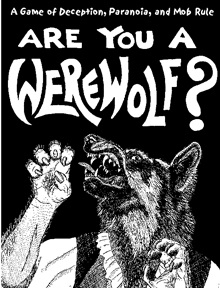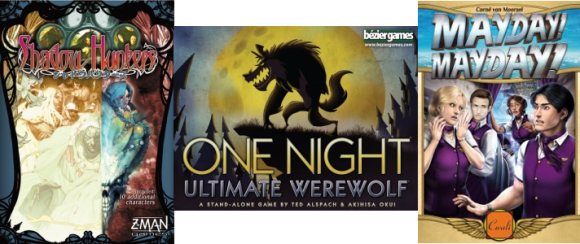
October’s Blood Moon has come and gone, but All Hallows’ Eve approaches, and we continue our thematic Game Updates with a look at the lycanthropic — the shapeshifters among the sheep — a writeup on Werewolves.
(TL;DR – Click here if all you’re interested in is the games added >)
One of the most common games, or families of games, requested by the users on Boardgaming.com is the “Werewolf” style of party game. There are dozens of variations on the theme, but they have a common dynamic: a large-ish group of people (7 or more makes for a decent game) are given roles identifying them as either Werewolves or Villagers. During the night, the Villagers sleep (close their eyes), while the Werewolves wake and decide on a Villager to kill. During the day, everyone wakes, and the discussion begins to decide which Villager is a wolf in the fold — that is, which of their number to lynch, hopefully having successfully rooted out one of the killers. If all of the Werewolves are killed, the Villagers win; if the Villagers’ numbers and the Werewolves’ are ever equal, the Werewolves win as they rise up and slaughter the remaining Villagers.
The game’s origins trace back to Russia in 1986, where Moscow University psychology major Dimitry Davidoff was teaching AP Psychology to high schoolers. He wanted to come up with a self-contained activity to help teach concepts to the class, one which required no prior knowledge or preparation. The original idea was for a subset of students to secretly agree on a topic of discussion, then return to the rest of the class and have them attempt to guess the topic. In observing these sessions, Davidoff realized “that WHO is in agreement is the biggest secret of all” — thus was the idea of Mafia born.
Mafia, the ancestor of Werewolf, embodies the concept of “the uninformed majority versus the informed minority”. Here, the majority are Honest, and the minority are connected to the Mafia. The game is a battle of wits between the two sides, with only the Mafia players knowing who their peers are, attempting to stay alive as paranoia and misdirection sunders the coalition of the Honest. From Davidoff’s classes, international students spread their understanding of the game, a viral idea before the permeation of 21st century Internet culture. The game propagated to Slovakia and Latvia, to Belgium, to China… and to the United States.

At the National Puzzlers’ League convention in 1997, an interactive-fiction developer named Andrew Plotkin (better known in the community as “Zarf”) learned the game. Plotkin originated the Werewolves vs. Villagers theme, abandoning the Mafia theme as less accessible to a wide audience. He was also able to accelerate the understanding of the game via the budding Internet. Plotkin’s new version of Davidoff’s parlor game spread like wildfire, grabbing the attention of new audiences. Variations cropped up along the way, but the main change that stuck was adding the Moderator role and the Seer role to the game. The latter, a role which Davidoff has criticized, allowed one Villager player to gain knowledge of one of the other players’ hidden role each night — though this knowledge might not save them, as if they went public with their information, the Werewolves would know who to target.

At this point, neither game had yet been commercialized — both Mafia and Werewolf were easily learned, and the “roles” could be simulated using notecards, or playing cards of opposing colors. This would remain true until Plotkin taught Werewolf to his game designer friends at Looney Labs. In 2001, they released the first edition of Are You a Werewolf?, which contained printed Role cards with artwork.
The popularity of the game grows even to this day, with multiple commercial variants being released. Some maintain the werewolf theme, such as The Werewolves of Miller’s Hollow or Lupus in Tabula. Several add new roles and situational elements (such as Villager residences) to the game. More recently, Ted Alspach’s Ultimate Werewolf raised over $137,000 in a Kickstarter for a Deluxe Edition of the game, surpassing the initial funding target by over 2600% (and their currently running campaign for One Night Ultimate Werewolf: Daybreak is nearing $100,000). Despite some enthusiasts’ protestations that the game can be played with a simple deck of playing cards, there is a clear appetite among devotees for professionally produced components.

As a bluffing/deduction-based party game with strong psychological underpinnings, Werewolf(/Mafia) has clearly tapped into the modern psyche in a manner to which few games can lay claim. It is played in its endless variations among gamers, students, church retreats, technical professionals, celebrities, prisoners, and countless others. It follows in the footsteps of the classic 19th and early 20th-century parlor games-turned-commercial success, such as Monopoly or Parcheesi, as well as the “hidden killer” murder-mystery games of the Algonquin Round Table.

Since the game concept is effectively in the public domain, expect to see these variants play out into the future. With currently available games on the market, you can replace your Werewolves with Cultists (Do You Worship Cthulhu?), Secret Society Members (The Castle of the Devil), or “infiltrator” Flight Attendants (Mayday!Mayday!). You can play in smaller groups without a moderator (One Night Ultimate Werewolf), and you can engage in combat between rival groups (Shadow Hunters).
The possibilities are endless.
Sources and further reading:
Andrew Plotkin’s “Werewolf” page
Dimitry Davidoff’s original “Mafia” rules (as retrieved from archive.org)
Werewolf: How a parlour game became a tech phenomenon (Wired Magazine UK)
User Requested Games
Games added that were user requested are marked below with: {G}
Request a game >
Werewolf Games
* Note: dates of publication reflect most recent commercially available editions.
{G} Lupus in Tabula
dV Giochi | 2009
Are You a Werewolf?
Looney Labs | 2012
{G} The Werewolves of Miller’s Hollow and expansions (Asmodee | 2012)
- New Moon (2005)
- The Village (2010)
- Characters (2013)
Ultimate Werewolf: Inquisition
Bézier Games | 2013
{G} One Night Ultimate Werewolf
Bézier Games | 2014
{G} Ultimate Werewolf: Deluxe Edition and expansions (Bézier Games | 2014)
- Artifacts (2014)
- Classic Movie Monsters (2014)
- Night Terrors (2014)
- Urban Legends (2014)
- Wolfpack (2014)
Non-Werewolf Variants
{G} Do You Worship Cthulhu?
Toy Vault Inc. | 2006
{G} Are You the Traitor?
Looney Labs | 2009
{G} The Castle of the Devil
dv Giochi | 2010
Shadow Hunters
Z-Man Games | 2011
Mayday!Mayday!
Cwali | 2013

Thank you, Jeff W., as always for adding games and for a howling good article! What a fantastic look at the original of the Werewolf games. I’m happy to see the Looney Labs version on here, as it’s been in my library for some time. I also added Are You the Traitor? to my library, a fantastic game of obfuscation and bluffing.
Hooray for Werewolf games!
Also, thanks so much for the really cool article on the history of the game. That was great!
*singing* Better stay away from him. He’ll rip your lungs out @Jim!
AAoooooo! Werewolves of Gamedom!
@Jeff W Thank you for the awesome article leading into the new inventory. 🙂 As someone drawn to critical review, cardboard history, the origins of various aspects of foundation gaming and the connections between various games – that was a cup of cream 🙂
And as always thanks for stocking the shelves.
ONUW arrives! Jeff W. has been hitting it out the park! We even get a nice historical article! Everybody should go to his page and show him some love with follows and likes (except Jack the Downvoter, Jack should stay away.).